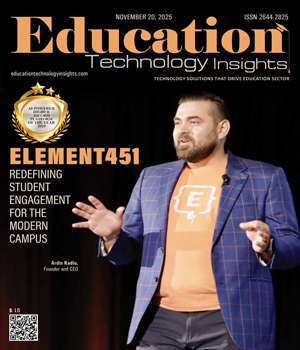THANK YOU FOR SUBSCRIBING
Be first to read the latest tech news, Industry Leader's Insights, and CIO interviews of medium and large enterprises exclusively from Education Technology Insights
Distance and Remote Learning in UK Higher Education
Dr Lucian Tipi, Associate Dean of Teaching, Education and Student Experience, Birmingham City University
Through this article, Dr Lucian Tipi examines the evolving landscape of higher education delivery in the UK. He explores the shift from traditional in-person and distance learning to blended and remote models driven by students' need for flexibility. Dr Tipi highlights how changing student demands and complex lives reshape higher education, emphasising the importance of online and remote learning options.
From the point of view of delivery mode, there used to be two main types of courses available to UK Higher Education students:
● In-person, face-to-face, on-campus delivery
● Distance / Remote learning, achieved through means of online delivery in the last 10-15 years
However, the landscape is changing. Particularly during the Covid pandemic, we see a convergence of these delivery modes with in-person, face-to-face courses increasingly having significant amounts of content delivered remotely and online. Students now expect it and my experience of the last couple of years’ university open days is that students ask for the amount of online content before making their decisions. They see the ability to engage online as an essential part of the HE offer, enabling them to manage their complicated lives, where university study is only a component and perhaps not the most important.
At the other end of the spectrum, we’re seeing established distance learning online providers such as Open University (OU) actively planning their move into the in-person, face-to-face delivery mode to cover the full spectrum of the UK HE market. This is in addition to the OU already mandatory in person days for some of their modules.
It could be soon enough that we will see the two delivery models above become:
● Blended delivery (with variable amounts of online remote delivery)
● Remote delivery (with full online remote delivery)
But what is behind this trend?
"Students now expect significant online content as part of their higher education, driven by the need for flexibility to manage complex lives, leading to a shift towards blended and remote delivery models."
This student behaviour is driven by the need (not want) to manage a degree within the context of their circumstances. It used to be the case that the best of the HE experience was to join a full-time Undergraduate course. Joining full-time, campus-based courses would give students academic engagement while also allowing them the opportunity to form new friendships and experience University campuses with all that they have to offer—social events, student societies, music nights and the occasional paid gig.
I would not recognise this picture today in many higher education institutions, particularly post-92 HEs. Our students' lives are much more complicated, leaving them much less time (if any!) to enjoy opportunities offered by their university campuses. Students still attend full-time, campus-based courses while, in many cases, holding full-time jobs and having other competing priorities that take up their time.
An analysis of student timetabling change requests (for on-campus, in-person sessions) made at Birmingham City University during the 2023-2024 academic year reveals that:
● approx. 20 percent of students depend on travel to attend their university course
● approx. 18 percent of students have care responsibilities
● approx. 36 percent of students have various work commitments
● approx. 26 percent of students need to manage other aspects of their lives
We can easily see that approx. 74 percent of students must be able to accommodate Work, Care and Travel alongside their academic studies. These are not lifestyle choices but reasons borne out of the need to juggle complex lives.
For me, it’s clear that students are after flexibility and the ability to study “on demand” at a time that suits them. This can only be realised through online delivery, or at least by recording taught sessions that students can engage with asynchronously.
Therefore, I can see only one future: the role of online, remote delivery will steadily increase, with the inevitable result that traditional UK HE providers will need to reconsider their offer to students. Whilst the traditional campus-based student experience may be a thing of the past, there are clear benefits that online delivery brings to students from deprived backgrounds, for whom the HE experience can never be a full-time commitment.
Read Also
The Power of International Education Collaborations
Designing Schools around Student Voice
What is Edtech Leadership in 2026
Designing Academic Leadership Around Real Lives
Why Student Success Begins with Being Seen
Inclusion is not a Department: The Systemic Ripple Effect of Belonging

I agree We use cookies on this website to enhance your user experience. By clicking any link on this page you are giving your consent for us to set cookies. More info























